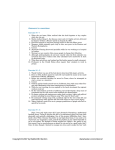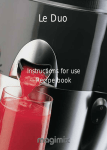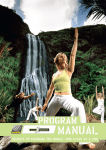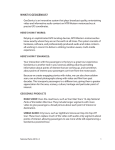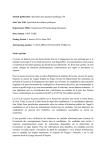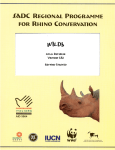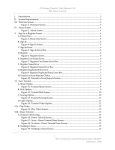Download Answers to Exercises
Transcript
Answers to exercises Exercise 28a–1 1. When she got home, Mina realized that she had forgotten to buy staples while she was out. 2. Martin Luther King Jr., the famous orator and civil rights activist, delivered his famous “I Have a Dream” speech on August 28, 1963. 3. David has played [or has been playing] soccer for the last fifteen years. 4. Mangoes, which originally grew only in Asia, now grow in the Eastern and Western Hemispheres. 5. Correct 6. Alexander Fleming discovered penicillin while he was working at a hospital in London. 7. Moving to a new country often causes people to change their lifestyles. 8. Although anthropologists do not know exactly when the first calendar was invented, they have evidence that solar calendars have existed for at least six thousand years. 9. When they moved here, my husband and his brother opened a small restaurant. 10. Professors in the United States often require their students to work in groups. Exercise 28a–2 1. Woody Guthrie was one of the best-known American folk singer–activists. 2. Born in 1912, Guthrie spent his early life surrounded by music in his small hometown of Okema, Oklahoma. 3. Before his twentieth birthday, he moved to Texas, where he attempted to start a career as a musician. 4. Correct 5. Guthrie and his family moved west to California along with many other Texans and Oklahomans who found employment as farmworkers. 6. While he was traveling, he was exposed to the harsh treatment the migrant workers received. 7. By the time Guthrie arrived in California, he had developed a deep sense of resentment for the rich owners who exploited poor farmworkers. 8. He began writing and singing more songs about workers’ rights and political protest, including his most famous song, “This Land Is Your Land.” 9. He continued writing songs with a political edge for the rest of his life and motivated many other popular folk and rock singers to carry on his legacy. 10. Today, Guthrie’s music lives on in younger generations of people who feel inspired by his words. Exercise 28a–3 Since I was only eight years old, I have dreamed of becoming a professional baseball player. Trying to develop the skill of a professional player has been both physically and mentally challenging. One of the greatest difficulties that I have faced is fear. When I became the pitcher on my high school team, I was under a lot of pressure; my teammates, coach, and all the students at my school depended on me to win games. The thought of losing terrified me. Before a few games in my first season, I put so much pressure on myself to win and to be a good leader that I froze. In time, though, I learned to manage my stress and to make the fear work Source: Marcy Carbajal Van Horn, Extra Help for ESL Writers, Supplement to Accompany Diana Hacker’s A Writer’s Reference, 6th ed. (Boston: Bedford/St. Martin’s, 2007). dianahacker.com/rules in my favor. By the time I was a senior, I had transformed the fear into energy that helped me stay alert and quick. Although I know I will have many more challenges to face in pursuit of my dream, I am confident that some day I will succeed. Exercise 28b–4 Good morning, Professor Weil. May I ask you for some advice about my course work? Professor Weil: Sure, Haley. What can I help you with? H: I would like to change my major. I’m enrolled as a biology major now, but I am not as interested in science as I thought I would be. P: I see. What major are you thinking of? H: Since I am very good at math, I think I would like to be a business major. P: That’s a good idea, but can you do well in classes that don’t involve math? H: I think so. Which courses must I take besides math? P: You will have to take some communications and writing courses. H: I can do that. I will go to the registrar and select my courses. Thank you, Professor Weil! Haley: Exercise 28c–5 Most people think of a trash bin as a finishing point rather than a starting point. However, a recycling bin can be the start of a new life for a piece of paper. After paper is put into an office bin, it is shipped to a recycling center, where it is sorted into types: office paper, cardboard, or colored paper. After it is sorted, it is sent to a paper mill, where it is chopped into dry pulp. The pulp is then mixed with water to form a wet substance called “slurry.” The slurry is sent through a screen, which removes little bits of excess materials such as glue, plastic, or staples. After it goes through the screen, the slurry is rinsed again to remove inks. Then the slurry goes through a machine that makes the paper fibers grow bigger. Next the slurry is watered down and placed on a screen, where it is pressed into long, thin sheets and dried on heated rollers. The dried sheets are rolled up and shipped off to other companies where they are processed and made into the paper products we use every day. Exercise 28d–6 1. If the governor is reelected, she will not raise the income tax. 2. I could not park my car next to the library because all of the spaces were taken. 3. Sadly, a cure for AIDS has not been found yet. 4. The book that we have to buy for our ecology class is not very expensive. 5. I tried to make a photocopy, but the copier was not functioning properly. 6. Sunnie did not come with us to the football game last Saturday. 7. Although Omar does not like to drive in traffic, he likes to race cars on the weekends. 8. Snow leopards are not extinct, but they are on the endangered species list. 9. Kim could not find lychees [or any lychees] at the supermarket because they are not very common in the United States. 10. I was disappointed that I didn’t know the woman’s name. Source: Marcy Carbajal Van Horn, Extra Help for ESL Writers, Supplement to Accompany Diana Hacker’s A Writer’s Reference, 6th ed. (Boston: Bedford/St. Martin’s, 2007). dianahacker.com/rules Exercise 28e–7 1. 2. 3. 4. 5. 6. 7. If Deborah had arrived earlier, she might have found a better parking space. I’ll buy you a soda if you come to the cafeteria with me. Correct Correct If I were a famous actor, I would move to Bel Aire and buy a mansion. If you use aloe on a burn, you can reduce the chances of developing a scar. You will have to pay late charges if you don’t return your rental video on time. 8. Unless the Security Council agrees, the UN will not send peacekeeping troops to war-torn countries. 9. When Rosa left for college every September, she closed her summer gardening business. Or When Rosa leaves for college every September, she closes her summer gardening business. 10. If Kevin were here with us today, he would be enjoying himself. Exercise 28f–8 When I was young, my family and I went on an annual camping trip in the canyons of the southwestern United States. One summer, I convinced my family to take a tour of several canyons: the Grand Canyon, Bryce Canyon, and Canyonlands National Park. I remember being amazed at each stop along the way. I loved looking up at the twisting towers of red rock, wondering how they had avoided falling down in the last several thousand years. (I can recall thinking that some might fall over if someone in the canyon sneezed a little too hard.) Even at that young age, I sensed the power of these remarkable landmarks and understood the spell that they had held over so many generations of residents and visitors. In my heart, I promised to go back to the canyons every year. Though I never planned to give up my promise, the commitments of adulthood have prevented me from taking annual trips back to the canyons. I miss visiting the red rocks on a regular basis, but I still manage to go back to the Southwest every few years. Breathing in the high desert air while gazing up at the red rock towers never ceases to refresh and rejuvenate me. Exercise 30a–1 When I was only a boy, I was known for being lazy. Every time my parents asked me to clean my room or study for my classes, I always found an excuse to avoid the work. Sometimes I would pretend that I was too tired; other times I would pretend that I had simply forgotten their request. Most of the time, however, I would try to approach the situation logically, arguing that since my older brother was stronger and had more life experience, he should be responsible for most of the household chores. However, when I started college, my life changed. I realized that in order to become the successful college student I wanted to be, I would have to take control of my life, change my bad habits, and act responsibly. Now I am no longer the lazy boy my parents knew when I was a child. I wake up early, exercise, and go to school. I am never late to my classes, and I always turn my assignments in on time. Although I am still far from perfect, I try to help others whenever I can. Whenever someone needs me, particularly at school or at home, I never try to hide as I did when I was just a boy. Source: Marcy Carbajal Van Horn, Extra Help for ESL Writers, Supplement to Accompany Diana Hacker’s A Writer’s Reference, 6th ed. (Boston: Bedford/St. Martin’s, 2007). dianahacker.com/rules Exercise 30b–2 It is common to think that being the oldest child in a family has the most privileges. However, there are several advantages to being the youngest child, too. First, it is important to note that by the time the youngest child is born, the parents have already had experience as parents. They know how to care for a newborn, and they tend to be more relaxed. Second, the youngest child has the opportunity to learn how to stay out of trouble. If the older children get into trouble, it is easy for the youngest child to learn from the older children’s mistakes. A third advantage of being the youngest child is that in many cases, the youngest gets extra attention from the older siblings. It is not unusual to see older siblings taking care of their younger siblings at school or protecting them from bullies. Exercise 30c/d/e–3 Possible revisions: 1. Coming to the United States changed more than my address. It changed the direction of my career. 2. My life here in Gainesville is different from the life that I lived in Bolivia. 3. Correct 4. I attended a culinary school, which was the best in Bolivia, and I was offered the chance to study for a short time in the United States. 5. When I first came, I met other students who had different majors. 6. Correct 7. Jin helped me realize the importance of having business experience. 8. I learned that although I enjoyed being a chef, I didn’t want to be a chef without business knowledge. 9. I decided to stay a bit longer in the United States, where I could study international business. 10. Someday I will combine both interests and start my own chain of specialized restaurants, which I hope to build all over the world. Exercise 30f–4 1. 2. 3. 4. 5. 6. 7. 8. 9. I have never seen a player hit a baseball so hard. Sue cooked the soup very slowly so that the vegetables would be tender. Correct After I finished my workout, I carefully stretched my tender muscles. The professor seemed surprised that the class finished the exam so quickly. After I read the user manual, I easily installed the new hard drive. My mother always told me that she loved all her children equally. As soon as I got the keys to my new car, I drove my friends everywhere. The government found out that the company manufactured the drug illegally. 10. Although she had a difficult time in the past, this year she very easily won the gold medal in cross-country skiing. Exercise 29–1 1. When people move to a new place, they definitely have to go through some changes. 2. The temperature dropped twenty degrees in a half hour yesterday. 3. Some governments help couples who have more than two children by giving them health insurance. Source: Marcy Carbajal Van Horn, Extra Help for ESL Writers, Supplement to Accompany Diana Hacker’s A Writer’s Reference, 6th ed. (Boston: Bedford/St. Martin’s, 2007). dianahacker.com/rules 4. When people are too busy, they sometimes forget to eat dinner. 5. Students are exposed to new experiences when they move to a new country. 6. I chose to have a small family so that I could give my children sufficient attention. 7. Marco became more familiar with nature when he studied in the rain forests of Brazil. 8. Let me give you some advice: Buy your books early. 9. A common effect of culture shock is loneliness. 10. Because our school doesn’t allow cars within the campus gates, I walk from my parking spot to the place where I need to go. Exercise 29–2 Heifer International is a nonprofit organization that provides animals to poor farmers and families around the world. The organization was started in the 1940s by a man named Dan West, a relief worker who gave people food during times of crisis. West realized that he could help people even more by giving them animals that could supply food — such as milk and cheese — for several years. He wanted to help people for the long term, and he wanted to help them have pride in themselves. Now Heifer serves communities in more than one hundred countries around the world. Its mission is to help families by providing some animals that the families can use to support themselves or start small businesses. Exercise 29–3 Possible revisions: A greeting is the way that a person addresses or acknowledges another person when the two meet. Types of greetings vary in different countries. People in Japan often prefer to greet nonverbally, with a bow and a smile. An African would likely greet a fellow African with a handshake. For the Maori people of New Zealand, the most common greeting is the hongi, which involves rubbing noses. In Poland, a kiss on each cheek is customary; but the Dutch custom is to kiss the right cheek, then the left, and then the right again. A traveler to another country would be wise to learn the greetings expected by its people. Exercise 30g–1 1. 2. 3. 4. 5. 6. 7. 8. 9. 10. confusing tiring boring working fascinating handwritten, typed satisfied hand-painted cleaning peeled Source: Marcy Carbajal Van Horn, Extra Help for ESL Writers, Supplement to Accompany Diana Hacker’s A Writer’s Reference, 6th ed. (Boston: Bedford/St. Martin’s, 2007). dianahacker.com/rules Exercise 31a–1 1. Does your dance class start on Monday or Wednesday? 2. Correct 3. As soon as Fiona moved into her dorm room, she put a poster of Einstein on the wall for inspiration. 4. My books are a little dusty because they were packed away in the garage for a year. 5. Dr. Horn is taking his students to Ghana for a study trip in early June. 6. My grandmother was born in Los Angeles, but my grandfather was born in Albuquerque. 7. My fraternity brothers like to play loud music on the street in front of our building. 8. My exam begins in two hours, but I’m not nervous at all. 9. Correct 10. Bret finished writing his term paper right at midnight. Exercise 31b/c/d–2 1. 2. 3. 4. 5. 6. 7. 8. 9. 10. I have trouble concentrating on my homework when my roommate is around. The senator was skilled at delaying controversial votes. I’m not worried about our verbs test on Wednesday. While Ellie proofread the group’s report, Sam and Tomi worked on the presentation slides. Correct The solution consists of sodium and water. I was afraid to board the plane because I’m not accustomed to traveling alone. Shea remained devoted to the teachings of his martial arts master. You can always count on Carole to help out when the office gets busy. Correct Source: Marcy Carbajal Van Horn, Extra Help for ESL Writers, Supplement to Accompany Diana Hacker’s A Writer’s Reference, 6th ed. (Boston: Bedford/St. Martin’s, 2007). dianahacker.com/rules






